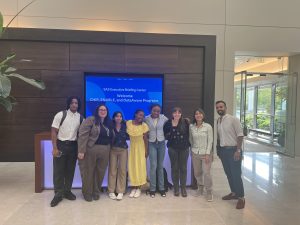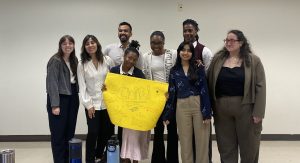
CHIP was thrilled to host 5 students over the summer for the ENABLE program! The Extensible Network-Accessible Biomedical & Health Informatics Lifelong learning Environment (ENABLE) is a seven-week program for undergraduate students. The face-to-face boot camp exposes students to Biomedical Health Informatics (BMHI) principles and encourages them to explore advanced training or careers in BMHI. The program focuses on training and diversifying the next generation of health data experts and exposing students to health informatics that may not otherwise have the opportunity for such training. ENABLE is designed to encourage and train program participants to develop projects embedded in their community as well as pursue additional training in data science and health informatics. The curriculum emphasizes health care data management, data analytics, and data visualization. This year, camp activities included faculty presentations and guest lectures, field trips to SAS and Renci, data mining and text mining, introduction to R programming, data visualization, introduction to statistical analysis, introduction to machine learning, and healthcare disparities.
Students in the program work on projects throughout the 7 weeks. They use healthcare data sets, clean data, create data visualizations and analyze data as part of their projects.. This year, project topics were extremely varied and focused on student specific areas of interest.

Justin States from NC A&T, majoring in bioengineering, titled his final project "A Study of Hip Fractures". He used audit data from the United Kingdom on the management, treatment, and outcomes of hip fracture patients. Justin collated and analyzed data focused on how his data could support improvements in patient outcomes and help guide healthcare policy for hip fracture management.
Beayonie Washington from Bennett College, majoring in journalism, had very little exposure to data management and programming prior to ENABLE. However, she successfully finished a project titled "From Menarche to Menopause: Tracing patterns in women’s global health", which analyzed the ages of females starting menarche or menopause globally and ways that data could support female reproductive care from a public health perspective.
Azreen Anwar from UNC-Chapel Hill, neuroscience major and data science and chemistry minor completed a project titled "Exploring Data Science in Health: Analyzing vulnerable populations that may be disproportionately affected by drug disparities". She looked at prescription cost data in the state of Florida comparing regions and populations to identify questionable pricing among vulnerable populations(if any).
Jessea James from Salem College, majoring in mathematics completed her project titled "Operation SWEET: Diabetes Prevention", which looked at data of diabetes in Saint Lucia, the increase in prevalence of the disease and reasons for that increase.
Xena Eriksen from Salem College, majoring in health science and mathematics completed her project titled, NC Mask Ban: A Predictive Analysis. She looked at the North Carolina mask ban law that took effect June 2024 and focused on evaluating public health and safety concerns resulting from the bill.
All students presented their final projects in the last week of the camp and impressed CHIP leadership, UNC School of Medicine partners and family and friends. Many thanks to program coordinator Addie Griffin and teaching assistants Pamela Chacon Uscamaita and Abhi Bhatia who worked together to successfully run the ENABLE program.

